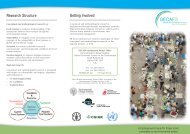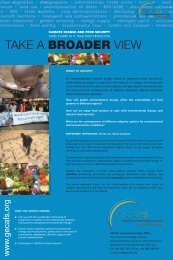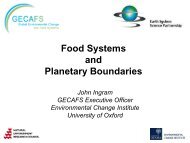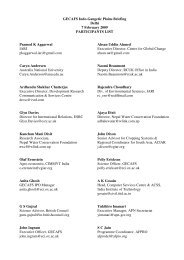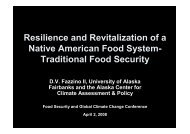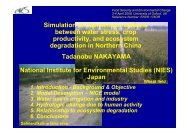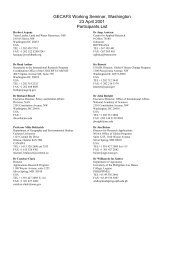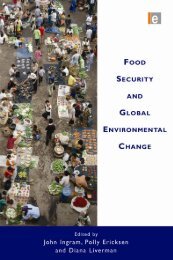From Food Production to Food Security - Global Environmental ...
From Food Production to Food Security - Global Environmental ...
From Food Production to Food Security - Global Environmental ...
- No tags were found...
Create successful ePaper yourself
Turn your PDF publications into a flip-book with our unique Google optimized e-Paper software.
While research on producing food has allowed remarkable gains <strong>to</strong> be made, the dominanceof this research community has overshadowed many other important aspects of researchrelated <strong>to</strong> the full food system. However, while production increase continues <strong>to</strong> be animportant goal, other activities such as processing food, packaging and distributing food, andretailing and consuming food are now all receiving increased attention, and the whole foodchain concept (“farm-<strong>to</strong>-fork” or “plough-<strong>to</strong>-plate”) is now well established (Maxwell andSlater, 2003; ESF, 2009). This concept not only helps <strong>to</strong> identify the full range of activitiesinvolved in the food system, but also helps <strong>to</strong> identify the ac<strong>to</strong>rs involved, the roles they play,and the many and complex interactions amongst them (Ericksen et al., 2009).A different approach <strong>to</strong> the food chain concept for food security research focuses on thesubstance of the definition from the 1996 World <strong>Food</strong> Summit, vis. food availability, foodaccess, food utilisation and their stability over time (FAO, 1996b; Stamoulis and Zezza,2003). These components are clearly different from the activities of producing, processing,distributing, etc. which characterise the food chain literature; rather than focussing on the“what we do” (i.e. the activities), they emphasise the “what we get” (i.e. the outcomes ofthese activities which collectively underpin food security).While individual ac<strong>to</strong>rs in the food system are of course primarily interested in their specificactivity (i.e., food producing, processing, distributing, etc.) people not involved in theseactivities are essentially only interested in the food security outcomes of the activities (ratherthan in the activities per se). Research, however, needs <strong>to</strong> recognise that the technologies andpolicies that influence the manner in which all the activities are implemented directly affectsthe overall food security outcomes. This important point is discussed further below inExample 2: “Analysing the consequences of interventions on food security outcomes”.The ‘food system’ concept and its development for GEC researchIn the late 1990s, as research interest within the international GEC research community grewon the interactions between GEC and food security, it became increasingly clear that thecomplexity of the issues involved needed a new approach; focus needed <strong>to</strong> move beyond theimpacts of climate change on crop productivity (which had largely dominated GEC-foodresearch <strong>to</strong> date). An innovative research agenda needed <strong>to</strong> clarify and frame (i) how GECaffects food security, (ii) how <strong>to</strong> adapt <strong>to</strong> the additional stress GEC brings, and (iii) how <strong>to</strong>implement our efforts so as <strong>to</strong> minimise further drivers of GEC. Based on a betterunderstanding of what constitutes food security, members of the GEC research communitycharged with developing the new agenda agreed that research should be based on ‘foodsystems’ (Gregory and Ingram, 2000; Ingram and Brklacich, 2002).The food system concept was not new: driven by social and political concerns, ruralsociologists had promoted this approach for some years (e.g. McMichael, 1994; Tovey,1997). Several authors have since put forward frameworks for analysing food systems, but38



